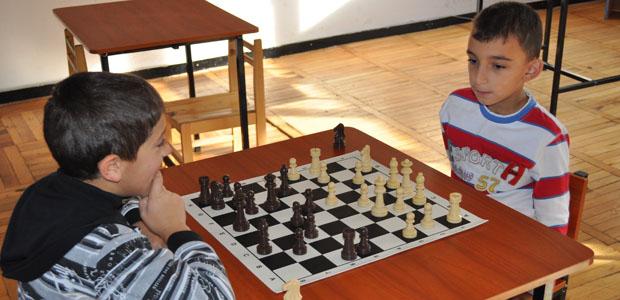In Armenia, schools bring chess into the classroom
Armenian students learning chess moves (Photo by Shant Shahrigian.)
Story from PRI’s The World. Listen to the above audio for a complete report.
Armenia’s public schools started mandatory chess classes for every second, third and fourth grader this year.
Twice a week, 7- to 10-year-old Armenians are getting 30 minutes of instruction in chess basics. The goal is they are able to play a competent game by the end of fourth grade.
One of those schools in in the former Soviet republic is Public School 81 where Grigor Martikian is drilling 20 second graders on how to move the bishop. He positions a bishop into the corner of a large model board in front of the class. The students follow along on chess mats on their desks.
Edouard Aroustian and Seta Kevorkian, both 7, have learned a new checkmate move. When I ask them if they know about Armenia’s national chess team, they nod and smile.
That team was the pride of Armenia this past summer, when it won the World Chess Team Championship in Ningbo, China. Armenians treat chess champions like star athletes. Chess is one of the most popular games here and there are 32 grandmasters in a nation of about 3 million.
Smbat Lputian is the president of Armenia’s chess academy. He spent the summer organizing training sessions for teachers around the country.
Lputian says mandatory chess isn’t so much about training the next generation of grandmasters. It’s more about fostering critical thinking and imparting values.
“Chess is a very honest game, a fair game,” Lputian said. “A person learns how to play honestly. It is giving a 7-year-old child a chance to think and make a decision. Chess is probably one of the best games for concentrating one’s attention on something for a long time.”
That said, Armenia probably wouldn’t mind if the classes also produce a new crop of chess champions.
Lputian says the curriculum begins in second grade because Armenian psychologists found that was the earliest time students can start to absorb the game.
At a private school , students are also playing chess. The Mkhitar Sebastaci school has had a full-time chess teacher for years, but chess is just another elective.
The school’s principal, Ashot Bleyan says there’s a popular view in Armenia that chess is a miraculous tool for fixing the country’s education problems.
“The simplicity of this approach disgusts me,” he says.
Bleyan himself is a former education minister but current officials seem set on compulsory classes. The government has already spent more than $ 2 million on them – a considerable investment for this still developing country.
———————————————————-
PRI’s “The World” is a one-hour, weekday radio news magazine offering a mix of news, features, interviews, and music from around the globe. “The World” is a co-production of the BBC World Service, PRI and WGBH Boston. More about The World.
